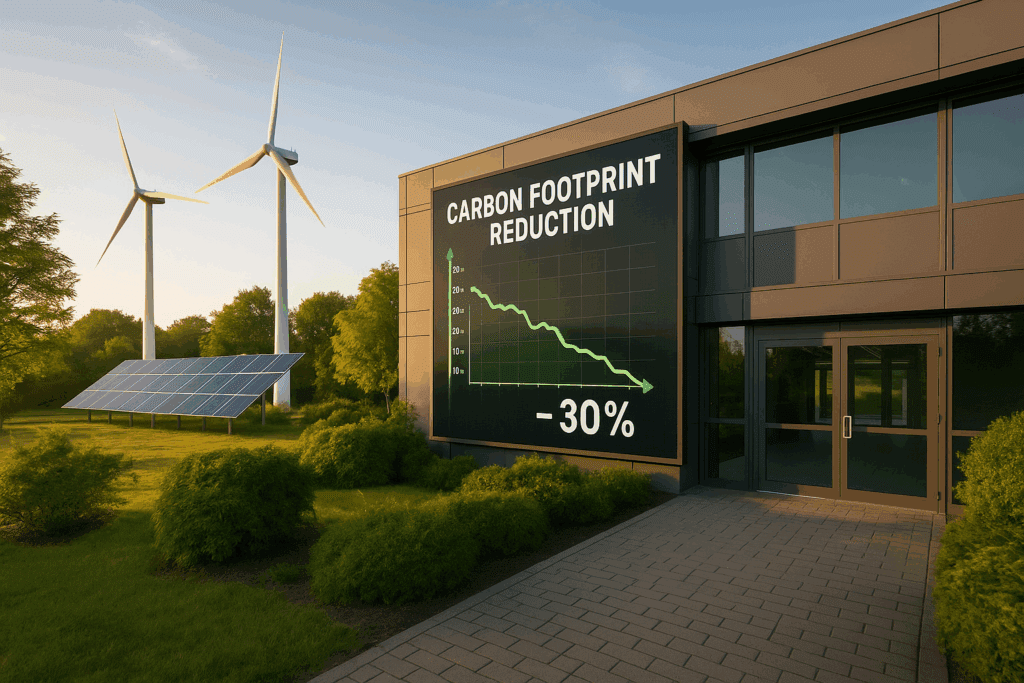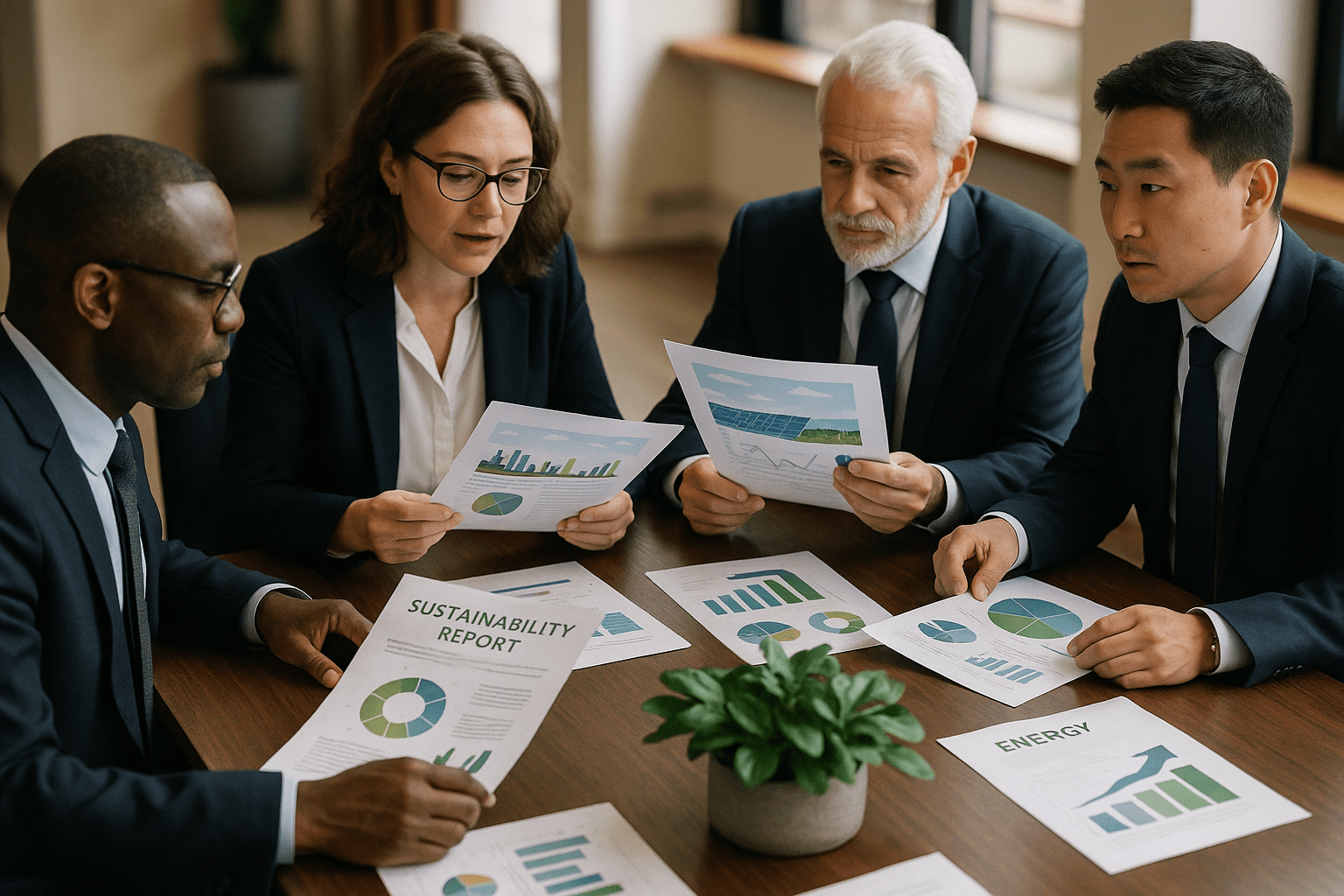Going green might just win you tenants. Today’s tenants—and investors—are looking beyond rent and revenue; they’re looking for values. That’s where the connection between Corporate Social Responsibility (CSR) and energy efficiency solutions comes in. For commercial property owners and managers, aligning your building’s operations with sustainable business practices isn’t just good for the planet, it’s good for your bottom line. Understanding how corporate energy efficiency plays into broader green business practices can help you stay competitive in a fast-changing market.
Corporate Social Responsibility is no longer a buzzword, it’s a business imperative. Companies that adopt energy management systems, invest in renewable energy solutions, and focus on carbon footprint reduction are seen as responsible stewards of the environment. This not only strengthens a company’s brand image but also attracts conscientious tenants and investors. When buildings operate efficiently and reflect a company’s values, it becomes easier to build trust and long-term occupancy. And in today’s real estate climate, trust is a major asset.
If you’ve been unsure about how to start or why it matters, this blog will walk you through the real-world benefits of combining sustainable business models with effective energy efficiency solutions. We’ll explore how this strategy supports environmental conservation, aligns with stakeholder expectations, and sets your property apart in a crowded marketplace. Stay tuned—and be sure to sign up for our newsletter so you don’t miss the strategies that can help your property lead in both performance and purpose.
Why Energy Efficiency Is Central to CSR

Energy efficiency has moved from a cost-saving tactic to a foundational element of responsible business. It directly supports environmental conservation by minimizing the energy consumption and carbon emissions associated with building operations. For commercial property owners, that translates into real-world benefits—not just in utility savings, but in positioning your property as a sustainable leader in a market that increasingly rewards environmental responsibility.
When implemented properly, energy efficiency touches almost every aspect of building performance. From upgrading HVAC systems and lighting to automating building controls, these changes result in lower energy bills and a smaller environmental footprint. Just as important, they serve as visible proof of your commitment to sustainable business practices—proof that resonates with tenants, investors, and regulators alike.
As energy costs rise and climate regulations tighten, being ahead of the curve is more than a best practice—it’s a safeguard. Buildings that adopt efficient technologies now will find themselves better prepared for the expectations of tomorrow’s marketplace, including performance-based building codes and ESG scoring systems that are rapidly becoming industry standards.
Aligning with Stakeholder Expectations
Today’s tenants, investors, and business partners are scrutinizing more than just financials—they’re evaluating how your property aligns with their values. Energy efficiency plays a vital role in meeting these heightened expectations. It demonstrates action, not just intent. When stakeholders see a property investing in energy-efficient infrastructure, they recognize a forward-thinking owner who is prioritizing both performance and responsibility.
This alignment builds trust and sets your building apart in a crowded landscape. Companies seeking office or retail space are increasingly making leasing decisions based on whether a property helps them meet their own sustainability goals. Investors, meanwhile, are applying ESG filters to their portfolios, and energy-efficient buildings are more likely to meet those standards.
Tangible ways energy efficiency supports stakeholder confidence include:
- Deploying Energy Management Systems (EMS) for continuous performance monitoring
- Earning green building certifications such as ENERGY STAR, LEED, or BREEAM
- Publishing annual sustainability reports that reflect operational improvements
- Demonstrating compliance with evolving carbon reduction mandates
In short, properties that fail to modernize may soon be viewed as liabilities, while those that embrace efficiency will be seen as low-risk, high-value assets in a changing market.
From Energy Savings to Business Advantage
The case for energy efficiency has always included lower operating costs, but today it delivers a broader range of business advantages. Energy-efficient buildings are increasingly seen as premium properties, capable of commanding higher rents and attracting mission-aligned tenants who are willing to pay for sustainability. More than just reducing overhead, these upgrades help improve tenant satisfaction and retention—two key drivers of long-term property value.
What’s more, integrating energy efficiency into your corporate strategy opens access to financing options and incentives designed to reward sustainability. Green loans, tax deductions, energy grants, and PACE financing all provide pathways to fund capital improvements with little to no upfront investment. These resources can accelerate your return on investment and free up cash for other priorities.
Sustainable buildings also benefit from reduced insurance premiums and lower maintenance costs, thanks to systems that are designed for longevity and optimized for performance. Altogether, this creates a compelling value proposition that strengthens your market position and prepares your asset for a future defined by environmental accountability.
The Role of Renewables in Long-Term Strategy
While energy efficiency focuses on doing more with less, renewable energy is about redefining where your power comes from. Solar panels, geothermal systems, and battery storage solutions are no longer experimental—they’re proven technologies that enhance a property’s energy independence and reduce exposure to grid volatility.
Integrating renewables into your building strategy not only cuts long-term energy costs but also significantly contributes to carbon footprint reduction. This is increasingly critical for meeting corporate emissions targets, qualifying for green certifications, and appealing to eco-conscious stakeholders. Adding renewables also enhances brand perception, especially in communities and industries where environmental performance is closely watched.
These systems may require upfront investment, but they offer long-term returns that go beyond economics. Renewable energy installations send a clear signal: your property isn’t just compliant—it’s leading the charge toward a carbon-neutral future. That message resonates deeply in an era where values-based decision-making is shaping the real estate market.
Building a Culture of Responsibility

Energy efficiency is not a one-time project—it’s a mindset. When property teams adopt a culture of sustainability, it transforms how they operate, maintain, and market their buildings. From training staff in energy best practices to engaging tenants in conservation programs, the commitment to responsible operations becomes part of your identity.
This cultural shift has a ripple effect. Tenants who see their landlord investing in green solutions are more likely to take pride in their space and participate in sustainability initiatives. Property managers who embrace data-driven performance monitoring are better equipped to respond to issues and optimize building systems. Ownership teams that prioritize CSR find themselves better prepared to weather regulatory, economic, and reputational challenges.
Over time, this culture pays dividends in the form of tenant loyalty, operational resilience, and investor confidence. It turns energy efficiency from a line item on a checklist into a core principle that defines how your property competes and thrives.
Lead with Purpose, Power with Efficiency
Energy efficiency isn’t just a trend—it’s a powerful tool for commercial property owners who want to lead with purpose and performance. In this post, we’ve explored how aligning energy-smart strategies with Corporate Social Responsibility builds trust, cuts costs, and boosts your property’s long-term value. From system upgrades to stakeholder alignment, efficient buildings show the world you’re serious about sustainability—and serious about success.
Whether you’re upgrading HVAC systems, exploring renewable energy, or just starting your sustainability journey, the key is to stay proactive. Today’s tenants and investors want more than space, they want to partner with owners who share their values. Ready to lead with confidence? Subscribe to our newsletter for more expert strategies that turn your building into a business advantage.
VertPro.com offers tools and services to help property owners and managers improve building energy efficiency and meet regulatory standards. Whether you’re looking for instant pricing on energy audits, need support with benchmark compliance, or want to explore available building upgrade options, VertPro® provides user-friendly technology solutions to simplify the process. Their platform helps ensure adherence to over 60 Energy Benchmarking and Efficiency Laws across the country.

